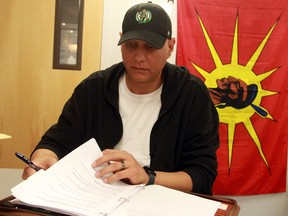Education
Ontario Teacher Secures Certification, Advocates for Indigenous Rights

A teacher from the Tyendinaga Mohawk Territory has achieved a significant victory against the Ontario College of Teachers (OCT), securing recognition of his Indigenous qualifications. On October 17, 2023, Andrew Brant received an email from the OCT informing him that his Multi Session Transition Certificate had been upgraded to a full Certificate of Qualification and Registration. This change affirms his status as a fully qualified teacher in Ontario.
Brant, who has dedicated 16 years to teaching, has been a permanent instructor at the Ohahase Education Centre in Deseronto for seven years, specializing in Mohawk language and Indigenous studies. He holds a Bachelor of Education from Queen’s University and is actively involved in various educational initiatives, including a podcast that addresses cultural, historical, and political issues.
Brant’s journey towards certification began in July when he sought exemption from a math proficiency test (MPT) mandated for all teachers in Ontario. He referenced a statement from the Ontario Minister of Education, Paul Calandra, in his request. However, the OCT promptly denied his appeal, indicating that the requirement was legislated by the Government of Ontario and could not be altered.
Undeterred, Brant took a proactive stance. He filed complaints, contacted the OCT, and meticulously assembled a case highlighting his rights under the Constitutional Act of 1982. This act affirms the rights of Indigenous people to teach their language using their own standards. He also cited relevant international laws and historical commitments, emphasizing the rights guaranteed through treaties.
“The most challenging part was piecing together the case law related to my situation,” Brant explained. “I was holding up a mirror to them, forcing them to follow their own policies and pointing out contradictions.”
Brant views the OCT and similar organizations through a critical lens, describing the education system as “one of the largest colonial institutions in Canada.” His perspective is shaped by the systemic challenges faced by Indigenous educators, who often find their qualifications questioned despite their expertise and dedication.
The OCT had originally scheduled a final ruling on Brant’s exemption request for October 20, but the decision arrived earlier than anticipated. Following an inquiry from the local press, Brant received notification of his certification. “I had no expectation that they’d hand down the decision early,” he remarked. “It shows the power of the media. The OCT is concerned about this kind of information becoming public.”
The weight of uncertainty lifted when he received the news. Initially, Brant felt a sense of relief, but the significance of the ruling soon became clear. “This is a step forward for others who have faced similar barriers,” he noted. “It’s a form of liberation. The OCT had to recognize our knowledge and credentials.”
Despite this personal achievement, Brant stresses that the OCT must acknowledge its previous missteps. “They need to correct their policies and attitudes,” he stated. “Other teacher colleges across the country look to them for standards.”
Brant’s experience serves as a reminder of the ongoing challenges faced by Indigenous educators in Canada, and his advocacy may inspire future changes that benefit both current and aspiring teachers.
-

 Education3 months ago
Education3 months agoBrandon University’s Failed $5 Million Project Sparks Oversight Review
-

 Science4 months ago
Science4 months agoMicrosoft Confirms U.S. Law Overrules Canadian Data Sovereignty
-

 Lifestyle3 months ago
Lifestyle3 months agoWinnipeg Celebrates Culinary Creativity During Le Burger Week 2025
-

 Health4 months ago
Health4 months agoMontreal’s Groupe Marcelle Leads Canadian Cosmetic Industry Growth
-

 Science4 months ago
Science4 months agoTech Innovator Amandipp Singh Transforms Hiring for Disabled
-

 Technology3 months ago
Technology3 months agoDragon Ball: Sparking! Zero Launching on Switch and Switch 2 This November
-

 Education3 months ago
Education3 months agoRed River College Launches New Programs to Address Industry Needs
-

 Technology4 months ago
Technology4 months agoGoogle Pixel 10 Pro Fold Specs Unveiled Ahead of Launch
-

 Business3 months ago
Business3 months agoRocket Lab Reports Strong Q2 2025 Revenue Growth and Future Plans
-

 Technology2 months ago
Technology2 months agoDiscord Faces Serious Security Breach Affecting Millions
-

 Education3 months ago
Education3 months agoAlberta Teachers’ Strike: Potential Impacts on Students and Families
-

 Science3 months ago
Science3 months agoChina’s Wukong Spacesuit Sets New Standard for AI in Space
-

 Education3 months ago
Education3 months agoNew SĆIȺNEW̱ SṮEȽIṮḴEȽ Elementary Opens in Langford for 2025/2026 Year
-

 Business4 months ago
Business4 months agoNew Estimates Reveal ChatGPT-5 Energy Use Could Soar
-

 Technology4 months ago
Technology4 months agoWorld of Warcraft Players Buzz Over 19-Quest Bee Challenge
-

 Business3 months ago
Business3 months agoDawson City Residents Rally Around Buy Canadian Movement
-

 Technology2 months ago
Technology2 months agoHuawei MatePad 12X Redefines Tablet Experience for Professionals
-

 Business3 months ago
Business3 months agoBNA Brewing to Open New Bowling Alley in Downtown Penticton
-

 Technology4 months ago
Technology4 months agoFuture Entertainment Launches DDoD with Gameplay Trailer Showcase
-

 Technology4 months ago
Technology4 months agoGlobal Launch of Ragnarok M: Classic Set for September 3, 2025
-

 Technology4 months ago
Technology4 months agoInnovative 140W GaN Travel Adapter Combines Power and Convenience
-

 Science4 months ago
Science4 months agoXi Labs Innovates with New AI Operating System Set for 2025 Launch
-

 Top Stories2 months ago
Top Stories2 months agoBlue Jays Shift José Berríos to Bullpen Ahead of Playoffs
-

 Technology4 months ago
Technology4 months agoNew IDR01 Smart Ring Offers Advanced Sports Tracking for $169










